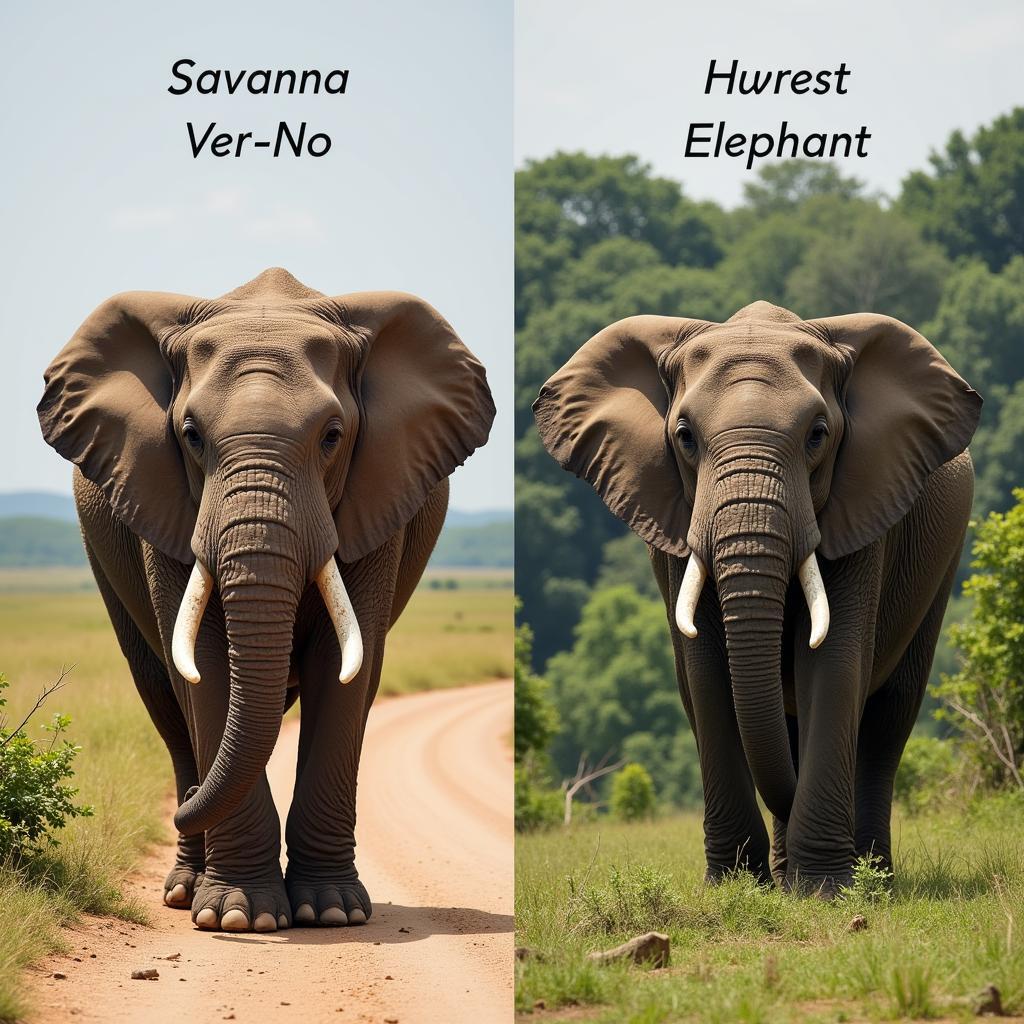African Elephant Information in English: A Comprehensive Guide
African Elephant Information In English is readily available, but understanding these magnificent creatures requires delving deeper than basic facts. This guide explores the intricacies of African elephants, covering their biology, social behavior, conservation status, and the challenges they face in the 21st century. After reading this, you’ll have a comprehensive understanding of these gentle giants and their vital role in the African ecosystem.
Understanding the African Elephant
African elephants are the largest land animals on Earth. They are divided into two species: the savanna elephant ( Loxodonta africana) and the forest elephant (Loxodonta cyclotis). While similar in appearance, these two species have distinct characteristics. Savanna elephants are larger, with broader ears and longer tusks, while forest elephants are smaller, with straighter tusks and darker skin. Both species play crucial roles in their respective environments. Savanna elephants shape the landscape by clearing vegetation, creating pathways for other animals, and dispersing seeds, while forest elephants contribute to forest regeneration and nutrient cycling.
 African Elephant Species Comparison: Savanna vs. Forest
African Elephant Species Comparison: Savanna vs. Forest
Physical Characteristics and Adaptations of the African Elephant
African elephants possess several remarkable adaptations that have allowed them to thrive in diverse African environments. Their large ears, richly supplied with blood vessels, help regulate body temperature in hot climates. Their trunk, a fusion of the nose and upper lip, serves as a versatile tool for grasping objects, drinking water, communicating, and even snorkeling. Tusks, elongated incisor teeth, are used for digging, foraging, defense, and social displays.
African elephants have thick, wrinkled skin that protects them from the sun and insect bites. Their large feet, with a spongy cushion on the sole, distribute their weight effectively, allowing them to move silently through various terrains. These physical adaptations, combined with their complex social structure, contribute to the elephants’ remarkable resilience.
The Social Life of African Elephants
African elephants are highly social animals, living in matriarchal herds led by the oldest and most experienced female, known as the matriarch. These herds can range in size from a few individuals to over a hundred. The matriarch plays a vital role in guiding the herd, making decisions about foraging, migration, and social interactions. Young elephants learn valuable survival skills from older members of the herd.
Communication and Intelligence
African elephants communicate through a complex system of vocalizations, including rumbles, trumpets, and roars, as well as through body language and infrasound, which are low-frequency sounds that can travel over long distances. They are highly intelligent animals with complex cognitive abilities, demonstrating empathy, self-awareness, and even a form of grieving.
African adventure travellers reviews often highlight the incredible intelligence and emotional depth of these creatures. Observing their interactions provides valuable insights into their social dynamics and intricate communication methods.
Threats and Conservation Efforts
Sadly, African elephants face numerous threats, primarily due to human activities. Poaching for ivory remains a significant challenge, driving some populations towards decline. Habitat loss due to deforestation and expanding human settlements further restricts their range and access to resources. Human-wildlife conflict, particularly in areas where elephant ranges overlap with agricultural land, also poses a serious threat.
Numerous conservation organizations are working tirelessly to protect African elephants. Initiatives include anti-poaching patrols, community-based conservation programs, and efforts to reduce human-wildlife conflict. Raising awareness about the importance of elephant conservation and supporting responsible tourism are crucial for ensuring the long-term survival of these magnificent animals.
The Future of African Elephants
The future of African elephants depends on our collective efforts to address the challenges they face. Strengthening law enforcement, combating illegal wildlife trade, and promoting sustainable land-use practices are essential for ensuring their survival.
It’s important to remember that African country mala and other nations across the continent are crucial partners in these conservation initiatives. Their commitment and collaboration are vital for achieving long-term success. Similarly, understanding the interconnectedness of ecosystems, like how an African country it borders botswana and south africa contributes to overall biodiversity, is essential for creating effective conservation strategies.
African elephants are not just iconic symbols of Africa; they are keystone species that play a crucial role in maintaining the ecological balance of the continent. By understanding their importance and supporting conservation efforts, we can ensure that future generations have the opportunity to marvel at these gentle giants.
Conclusion
African elephant information in English provides a gateway to understanding the complexities of these remarkable animals. From their physical adaptations and social intelligence to the threats they face and the ongoing conservation efforts, learning about African elephants fosters appreciation for their crucial role in the African ecosystem. By supporting responsible tourism and contributing to conservation initiatives, we can all play a part in securing a future for these majestic creatures.
FAQ
- What are the two species of African elephants? Savanna elephants and forest elephants.
- What is the biggest threat to African elephants? Poaching and habitat loss.
- How do African elephants communicate? Through vocalizations, body language, and infrasound.
- What is the role of the matriarch in an elephant herd? She leads the herd and makes important decisions.
- How can I help protect African elephants? Support conservation organizations, choose responsible tourism, and raise awareness.
- Where can I find further information on African adventure travellers reviews? african adventure travellers reviews
- Is there more information about specific African countries, like Zambia? Yes, you can find more information on african country zambia.
Further Exploration
Are you interested in learning about other fascinating aspects of Africa? Explore our articles on African Dream Hotel in Tamale: african dream hotel tamale or discover intriguing details about other countries like: african country mala. We also have a great article detailing an african country it borders botswana and south africa.
Need Help?
For further assistance or information regarding African travel and wildlife conservation, please don’t hesitate to contact us.
Phone: +255768904061
Email: kaka.mag@gmail.com
Address: Mbarali DC Mawindi, Kangaga, Tanzania.
Our customer service team is available 24/7 to assist you.


